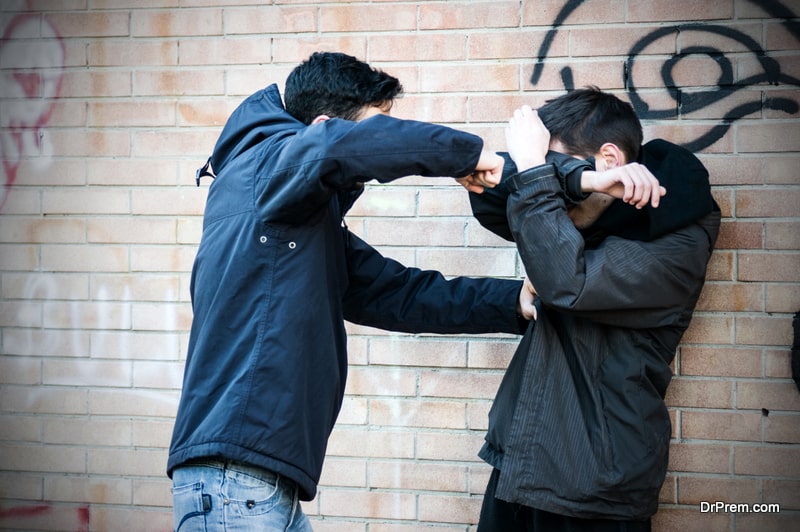Toxic masculinity hurts people of both genders. Our society is still harboring stereotyped notions about masculinity, which ends up harming a boy’s psychological and social development. We need to teach our boys that boys can keep their anger in check, express emotions, and that they are strong and masculine even when they cry. Teenage boys these days are bombarded with violent images of superheroes’ extreme violent behavior, who do not respect any boundaries. To help fix or prevent toxic masculinity in teen boys, every parent of a boy, teen or tween or even younger need to do a few things:
6 Ways to fix toxic masculinity in teen boys
Manliness or masculinity is defined as the behaviors, attributes and roles associated with men and boys. These behaviors turn unacceptable and become an example of toxic masculinity in teen boys when they hurt others and ultimately have a negative impact on the boys. As parents, we have to send the right messages about masculinity to our teenage boys and here are some ways to do that.
1. Explain the harm due to toxic masculinity
 Teens are the time when hormones are raging, and boys recognize that they are turning into men. We can help them be good people and thus great examples of masculinity by pointing out the differences between acceptable and non-acceptable masculine behavior. Boys must learn to align their male characteristics with good manners, which will help them become well-integrated members of society. This is one of the ways to how to combat toxic masculinity in teen boys.
Teens are the time when hormones are raging, and boys recognize that they are turning into men. We can help them be good people and thus great examples of masculinity by pointing out the differences between acceptable and non-acceptable masculine behavior. Boys must learn to align their male characteristics with good manners, which will help them become well-integrated members of society. This is one of the ways to how to combat toxic masculinity in teen boys.
2. Let them cry
Perhaps the most common things we still hear people telling boys, us included sometimes, is that ‘Boys don’t cry’. This is one of the worst things to say to a boy and is quite confusing as crying is a normal emotion, just as laughing, yelling, moping and so on. DO let your teen boy cry, just as you would have let your teenage girl cry. Suppressing this very important emotion may lead your teenage son to act out in a dangerous way. Do not let other people tell your son, even at a very young age not to cry – you may lose a few friends but you will raise a normal, happy son!
3. Never use gender based insults
 Gender based insults like ‘don’t act like a girl’, ‘don’t be a sissy’, do serious harm to the psychology of boys, which runs quite deep. Boys get the wrong idea that girls are not equal to them. Thus, the patronizing attitude of many grown men towards women stems from seemingly innocuous phrases like these which they hear in their childhood. These men feel superior to women and cannot accept it when they see successful women.
Gender based insults like ‘don’t act like a girl’, ‘don’t be a sissy’, do serious harm to the psychology of boys, which runs quite deep. Boys get the wrong idea that girls are not equal to them. Thus, the patronizing attitude of many grown men towards women stems from seemingly innocuous phrases like these which they hear in their childhood. These men feel superior to women and cannot accept it when they see successful women.
Some men take it out by molesting women and belittling them. The psychology behind men feeling superior to women is rooted in gender based insults, among other things. To help your teenage son treat the feminine gender with respect, whether they are 8 or 80years, you have to stop using insults which belittle women. This is one of the ways to fix toxic masculinity in teen boys.
4. Let them watch documentaries about great women achievers
One of the tips to stop teen boys’ masculinity becoming unacceptable is that they should read the biographies of women achievers in many different fields. They should watch documentaries or films about women scientists, doctors, soldiers, artists and so on, so that they develop a healthy respect for the opposite gender.
5. Stop expecting stereotyped behavior
 There is another very common mistake we, as parents of boys make – it is to expect stereotyped behavior from them. The psychology behind ‘boys will be boys’ idea might make violence (getting into and starting fights), sexism and promiscuity seem normal to most parents of boys. We need to throw these stereotyped notions out the window, so that we can teach our boys to become gentle and kind, while retaining their masculinity. This is one of the ways to fix toxic masculinity in teen boys.
There is another very common mistake we, as parents of boys make – it is to expect stereotyped behavior from them. The psychology behind ‘boys will be boys’ idea might make violence (getting into and starting fights), sexism and promiscuity seem normal to most parents of boys. We need to throw these stereotyped notions out the window, so that we can teach our boys to become gentle and kind, while retaining their masculinity. This is one of the ways to fix toxic masculinity in teen boys.
6. Give consent lessons at an early age
Teenage boys will soon be getting into dating and they need to know about boundaries. It’s best to start consent lessons at an early age, since the time they were kids. We can show them what consent is through our behavior and actions.
You can use tickling rules to make them understand when they can touch another person – for example, they should never tickle someone unless they ask permission first and they should immediately stop when the other person says stop. You too, must stop tickling your son when he says stop, to help him understand.
In order to fix toxic masculinity in teen boys, you should sit them down and discuss consent with them. This would help them to interpret and negotiate their way into the adult world as compassionate, responsible adults. Teach them that no and stop means no and stop. They have to learn to read body language. One of the most important things you can teach your boy is to tell them never to interpret silence as ‘yes’. Always teach them silence means ‘no’ and they will be safe from making any regrettable mistakes!
7. Talk often and openly about the ways in which sex and violence are depicted in media and games
 One of the ways to combat toxic masculinity in teen boys is to help them watch the violence in action movies and games in a critical manner. A recent study showed that superheroes in action movies were much more violent than the villains they were fighting. Watching these movies gives the idea to boys that it is ok to use violence to fight their battles.
One of the ways to combat toxic masculinity in teen boys is to help them watch the violence in action movies and games in a critical manner. A recent study showed that superheroes in action movies were much more violent than the villains they were fighting. Watching these movies gives the idea to boys that it is ok to use violence to fight their battles.
Movies and games plant ideas in the subconscious of teenage boys which might affect their behavior. The negative ways of impressing women and not taking no for an answer are seen in many mainstream movies. These dialogues and ideas need to be analyzed and shown as harmful and unrealistic. One of the tips to stop negative masculine behavior is not to allow negative messages take root in the subconscious.
What we learn from childhood affects our behavior in adult life, including our behavior as young teenagers. We, as parents can help our sons to become well-adjusted members of society by teaching them how to handle themselves in a respectable way, which earns them the admiration of all.



